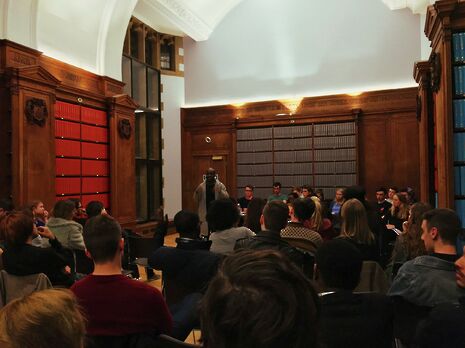Jesus votes in cockerel row
Students debated last night on proposals to return Jesus College’s Benin Bronze cockerel to Nigeria

Fierce disagreements broke out in a Jesus College Student Union (JCSU) meeting on Thursday over proposals put forward by the Benin Bronze Appreciation Committee (BBAC) to repatriate a bronze cockerel to Nigeria. An amended motion was passed in favour of returning the statue, taking into account the concerns raised by opposition to the draft paper.
In an 11-page document entitled “Proposal to Repatriate Benin Bronze’, the committee set forth detailed plans for “returning [the Benin Bronze] to its place of origin”. In it, the argument put forward for doing so was twofold, with the document claiming that repatriating the cockerel was “both intrinsically and instrumentally good”. It claims that returning to the “community from which it was stolen” was “just”, and that “the contemporary political culture surrounding colonialism and social justice, combined with the University’s global agenda, offers a perfect opportunity for the College to benefit from this gesture.”
The cockerel that has resided in Jesus since 1930 was recovered from the royal palace of the Oba during the ‘Punitive Expedition’ in 1897.
In his opening speech, Amatey Doku, a Sociology finalist at Jesus, stated that the motion called on Jesus members to support not only the repatriation but also for two further recommendations, as outlined in the draft proposals. These are, as the paper notes, “that the College hosts a handover ceremony with representatives from the Royal Palace, Benin, or the Nigerian Government” and that the “college commissions a new piece of their choice for the Hall”. He emphasised the need for a “positive repatriation process” and sought to illustrate the mutual benefit that might be obtained from the cockerel’s repatriation.
After addressing concerns raised by a Jesus member over where the bronze cockerel will go – it would reportedly go back to the Royal Palace – the opposition to the motion were given the opportunity to make the case.
Nadine Batchelor-Hunt, a second-year Classicist, began her argument by stating that she agreed with the argument that the bronze cockerel ought to be repatriated but that she “immediately had issues” with the proposals as put forward in the draft proposals.
She was critical of the language of the proposals insofar as they referenced “reaping the benefits” of the repatriation and sought to challenge the “neocolonial narrative” that she believed pervaded the document.
Batchelor-Hunt was especially critical of the implication in the draft proposal that the repatriation offered an opportunity to advance the university’s “global agenda”, questioning the link between giving back to the Benin people their bronze statue and, as the language of the draft document states, providing an “opportunity for the College to benefit from this gesture.”
Jason Okundaye, a member of the Benin tribe and a theology student at Pembroke, called the proposals “completely unprofessional” and branded assertions that Jesuans would be doing a moral thing by repatriating the cockerel “paternalistic narration”. He admonished the comical language of the draft proposals as having turned the “massacre of [his] people” into a “joke” and called the draft proposals “disrespectful to Nigerian culture”. He also drew attention to the fact that the document does not refer to the bronze cockerel by its proper name, okukor.
JCSU’s Racial Equalities Officer, Ore Ogunbiyi, defended the proposals by defending them as a “draft” that was subject to change through extensive consultation. She claimed that it was a vote to move forward with the repatriation process while maintaining a wide consultation.
A fundamental disagreement emerged between those in favour and opposed to the motion over the meaning of a clause in the motion which stated that the Benin Bronze Committee “exclusively” was the “right body to continue to work on the proposal and present it to the College.” Those opposed to it claimed that it was an attempt to systematically silence black voices, just as they alleged that a procedural motion at the beginning of the OGM to allow non-JCSU members to speak was. Batchelor-Hunt claimed that Okundaye had been “told that his view will not be taken into account”.
In an attempt to accommodate both views while reconciling their shared desire to see the Benin cockerel repatriated, an amended motion was put forward that passed.
The amendment stated: “The Master will be informed that the college supports the proposal to repatriate the okukor.
After this stage, an expanded committee will meet, including other members of the BME community, to redraft the proposal. It will then be submitted to the next college council committee, provided the proposal has been finalised.”
A representative of the BBAC declined Varsity's request for comment.
 News / Judge Business School advisor resigns over Epstein and Andrew links18 February 2026
News / Judge Business School advisor resigns over Epstein and Andrew links18 February 2026 News / Gov grants £36m to Cambridge supercomputer17 February 2026
News / Gov grants £36m to Cambridge supercomputer17 February 2026 News / Hundreds of Cambridge academics demand vote on fate of vet course20 February 2026
News / Hundreds of Cambridge academics demand vote on fate of vet course20 February 2026 News / CUCA members attend Reform rally in London20 February 2026
News / CUCA members attend Reform rally in London20 February 2026 News / Union speakers condemn ‘hateful’ Katie Hopkins speech14 February 2026
News / Union speakers condemn ‘hateful’ Katie Hopkins speech14 February 2026










